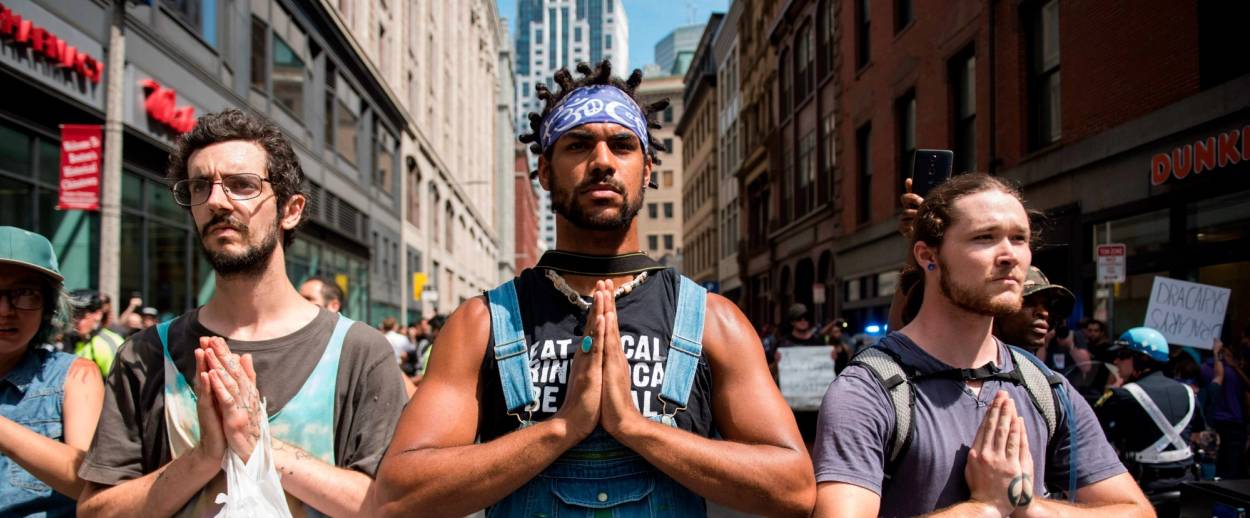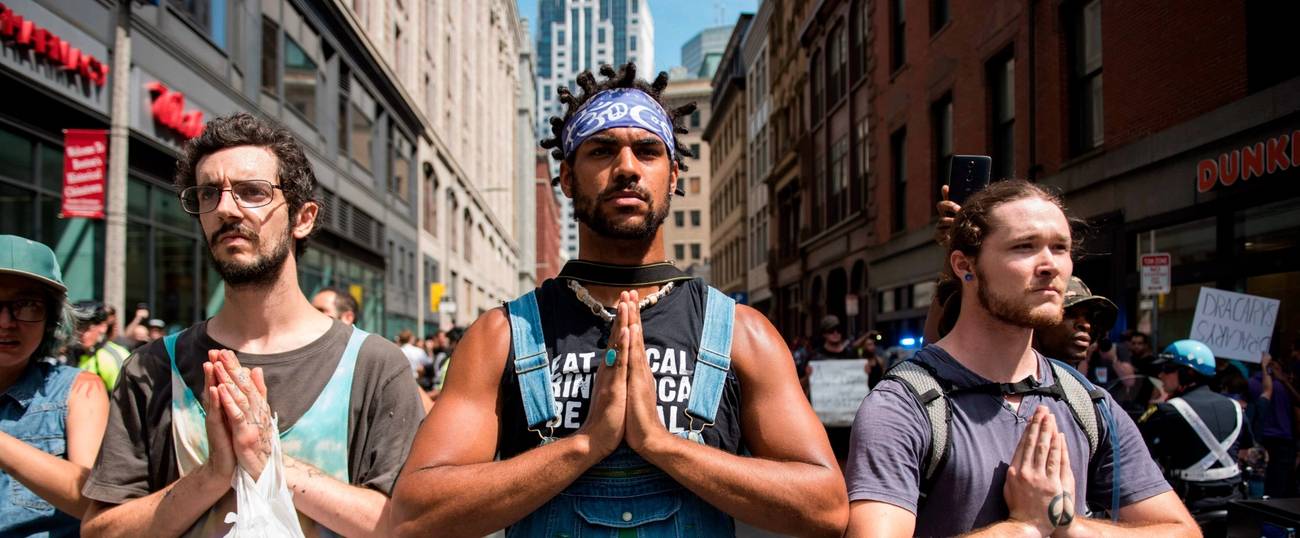Later this week, the March for Racial Justice will—I hope—choke the streets of our nation’s capital. If the current momentum against President Trump can be channeled to full potency, I believe it could be the most significant display of public fury on issues of race and inequality since Martin Luther King’s march on Washington in 1963.
Sadly, I won’t be there. I can’t be there.
I’ve attended a handful of rallies since Trump ascended in January. The largest was the Women’s’ March in D.C. the day after inauguration. As empowered as I felt that weekend, I knew I was there as a supporting actor: That day belonged to women. I had my own existential fears about the incoming administration, but I was there to support others—and did so consciously, so as not to coopt their stage.
The Racial Justice March, however, would be unreservedly a day for me to express my experience—mine and the millions of people of color like me. The time to wear out my shoes and lose my voice, to stand with the like-minded on a national and world stage and tell the current administration exactly why and how its values—to the extent that it even has any—are anathema to me.
It wouldn’t have been my first foray into demonstration. My Jewish progressive mother and my Black working-class father had me attending events before I could walk. My childhood was filled with Civil Rights-era hymns and folk songs, learned both at my Brooklyn daycare center and my Yiddish leftist summer camp. I spent many weekends on buses down to Washington attending peace and human rights rallies that I mostly didn’t understand.
As I was growing up, the names Amadou Diallou, Abner Louima and Sean Bell rang in my ears. The only time I remember seeing my father scared was when he spoke about the murder of Patrick Dorismond and how easily it could have happened to him. My father had a set number of emotions he would display regularly: Fear—until that moment—had not been one of them.
And then it happened to me. I and others in my generation witnessed the murders of Michael Brown, Trayvon Martin, and Eric Garner. I felt the same fear, the same terror—and the same need to make my voice heard.
But in a cruel twist of intersectional fate, the march has been scheduled to coincide with Yom Kippur, the holiest day in the Jewish Calendar—which means I and many of my racially conscious Jewish Comrades will be unable to take part.
In the summer of 2016, Trump was running for president—but at that point it seemed unlikely that he’d win. I was walking home after taking part in an anti-police brutality protest when I stumbled into my own terrifying interaction with the NYPD. As I neared my home, I saw three officers outside my door. I asked them if anything was wrong. One of the officers moved for his holster. I remember how his hand lingered there, neither removing his service weapon nor dropping to his side. I remember how unapologetic he was. Turns out they were standing there for no reason at all. But I remember fumbling with my keys as I struggled to get inside, and the feeling of relief when I was safely in my own apartment.
At that point, I was already pretty scared of Trump; his racist rhetoric a harbinger of dark times for Black Americans, but the incident flipped a switch. This was less than a month after the snuff videos of Philando Castile and Alton Sterling shocked the country. My fear and anger were refined by the terror of my own encounter. So the election felt like more than a mere quadrennial civic exercise. To me, it seemed like a referendum on the validity of the African-American existence. I was not only angry at Trump voters, but third-party voters, non-voters—anybody who didn’t utilize the full force of their electoral might to thwart him.
Many of my less racially-conscious friends didn’t understand why I was so worried. They didn’t foresee him rounding up black men and shooting them in the streets—though of course neither did I. Most oppressions toil in obscurity churning out millions of ruined lives with untold wasted potential. This is what I feared: Not mass executions or re-enslavement, but a pernicious slide into mediocrity and destitution, all accelerated by neglect and abuse.
The post-election protests enabled me to realign with my leftist roots. My mother’s father was a member of the Communist party. Through the various other leftist organizations, I became more committed to progressive causes. So when a racial justice group organizer sent me an invitation for the march in September, I clicked “attending” without even looking at the date: Whenever it was, I thought, I will be there.
Then I saw the date—maybe the one and only day of the year I COULDN’T be there.
The nature of the commemoration added a subtle irony in the otherwise divisive incident is that it stems from a point of cultural similarity. Jews have a long tradition of observing occasions of sadness well as occasions of joy. Half the dates on the Jewish Calendar are in some part anniversaries of sorrow. We commemorate the dead not on the day they were born, but on the day that they left us. The fast of Yom Kippur, one of pure spirituality, is equaled by only one other day, The Ninth of Av, when a litany of tragedies and massacres befell the Jewish people.
In response to the furor, March organizers released a moving and compassionate explanation and apology. In the statement, organizers noted that they chose to use the event to commemorate an atrocity that often eludes the collective American memory: September 30th is the anniversary of the Elaine Massacre, when as many as 237 blacks were killed. It makes sense that the march be should against the most conspicuous expressions of racism. They also noted “[that] mistake highlights the need for our communities to form stronger relationships.”
Read the tone and language here, which feel deeply sincere. This is not a point to be taken lightly, as intentions matter in these moments, sometimes even more than whether one does or does not get what he or she wants.
It’s a trying moment for me. Confrontations on race, language and politics have often put me at odds with the Orthodox Jewish community. That lack of ideological solidarity was eventually filled by social justice organizing. So, being sidelined on the left at such a defining moment is gutting. The unfortunate scheduling of the Racial Justice March only exacerbated some of the anxiety I felt as a Jew on the Left. The oversight was not as aggressive as some harsh language BDS resolution or the confrontations that pro-Israel Jews have experienced at various pride marches, but it was another point in a growing constellation of Jewish discomfort in the progressive spectrum. Yes, many of us will be marching the next day, but separately and with diminished sense of solidarity with the movement at large.
Every black Jew will tell you that maintaining both identities is a constant battle; internally and externally. The Jewish community has an innate thread of solidarity built in it’s always there even when philosophical differences lead to animosity, the bonds of a commonality exist; sometimes adding fuel to the fire. The Jewish calendar is sprinkled with festivals and holidays that are observed collectively. To not adhere is to be excised from the people; one of the worst consequences in Jewish Law, even worse than death.
On the other hand solidarity is crucial to civil rights. If MLK had walked alone on the Edmund Pettis bridge, where would we be? Would his speech at the March on Washington have resonated if it was given to the empty reflecting pool? For the disenfranchised to challenge the powerful, they must access their own power. This power lies not in arms or in capital, but in numbers. To stand apart from comrades at such a moment is to withhold my individual power from the collective.
So, which does one choose?
Thankfully in the end, there’s a compromise; and perhaps, in a way, this is as it should be. Even though it wasn’t the organizer’s first choice, I’ve come to think that their choice of day is ultimately the correct one—a feeling I was able to realize because, their own expressions of hope for solidarity with and engagement with Jews and the Jewish experience felt real and forthcoming and honest, and devoid of the noxious if subtle dogwhistling and worse going on inside some pockets of the left these days. The white-knuckled indignation I had felt at the organizers exclusion intersectional oversight has been replaced by begrudging acceptance that there’s something beneficial to the FOMO I and other Jews will feel. So We’ll take to the streets the next day; not in Washington, at the seat of Trump’s empire, but in New York, on our shared home turf, doing what Jews have always been commanded to do and speaking truth to power.

